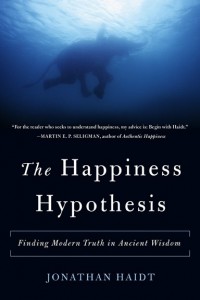By Jonathan Haidt. 2006.
Chapter 5: The Pursuit Of Happiness
What Mary has that Bob lacks are strong connections. A good marriage is one of the life-factors most strongly and consistently associated with happiness. Part of this apparent benefit comes from “reverse-correlation”: Happiness causes marriage. Happy people marry sooner and stay married longer than people with a lower happiness setpoint, both because they are more appealing as dating partners and because they are easier to live with as spouses. But much of the apparent benefit is a real and lasting benefit of dependable companionship, which is a basic need; we never fully adapt either to it or to its absence.
…there are two fundamentally different kinds of externals: the conditions of your life and the voluntary activities that you undertake. Conditions include facts about your life that you can’t change (race, sex, age, disability) as well as things that you can (wealth, marital status, where you live). Conditions are constant over time, at least during a period in your life, and so they are the sorts of things that you are likely to adapt to. Voluntary activities, on the other hand, are the things that you choose too do, such as meditation, exercise, learning a new skill, or taking a vacation. Because such activities must be chosen, and because most of them take effort and attention, they can’t just disappear from your awareness the way conditions can. Voluntary activities therefore, offer much greater promise for increasing happiness while avoiding adaptation effects.
One of the most important ideas in positive psychology is what Lyubomirsky, Sheldon, Schkade, and Seligman call the “happiness formula:”
H = S + C + V
The level of happiness that you actually experience (H) is determined by your biological set point (S) plus the conditions of your life (C) plus the voluntary activities (V) you do.
Chapter 6: Love and Attachments
As I see it, the modern myth of true love involves these beliefs: True love is passionate love that never fades; if you are in true love, you should marry that person; if love ends, you should leave that person because it was not true love; and if you can find the right person, you will have true love forever. You might not believe this myth yourself, particularly if you are older than thirty; but many young people in Western nations are raised on it, and it acts as an ideal that they unconsciously carry with them even if they scoff at it.
But if true love is defined as eternal passion, it is biologically impossible. To see this, and to save the dignity of love, you have to understand the difference between two kinds of love: passionate and companionate.
Companionate love grows slowly over the years as lovers apply their attachment and caregiving systems to each other, and as they begin to rely upon, care for, and trust each other. If the metaphor for passionate love is fire, the metaphor for companionate love is vines growing, intertwining, and gradually binding two people together.
Passionate love is a drug. Its symptoms overlap with those of heroin (euphoric well-being, sometimes described in sexual terms) and cocaine (euphoria combined with giddiness and energy). It’s no wonder: Passionate love alters the activity of several parts of the brain, including parts that are involved in the release of dopamine. Any experience that feels intensely good releases dopamine, and the dopamine link is crucial here because drugs that artificially raise dopamine levels, as do heroin and cocaine, put you at risk of addiction. If you take cocaine once a month, you won’t become addicted, but if you take it every day, you will. No drug can keep you continuously high.
Passionate love does not turn into companionate love. Passionate love and companionate love are two separate processes, and they have different time courses. Their diverging paths produce two danger points, two places where many people make grave mistakes.
If you want to predict how happy someone is, or how long she will live (and if you are not allowed to ask about genes or personality), you should find out about her social relationships. Having strong social relationships strengthens the immune system, extends the life (more than does quitting smoking), speeds recovery from surgery, and reduces the risks of depression and anxiety disorders.
And it’s not just that “we all need somebody to lean on”; recent work on giving support shows that caring for others is often more beneficial than is receiving help. We need to interact and intertwine with others; we need the give and the take; we need to belong. An ideology of extreme personal freedom can be dangerous because it encourages people to leave homes, jobs, cities, and marriages in search of personal and professional fulfillment, thereby breaking the relationships that were probably their best hope for such fulfillment.
Chapter 8: The Felicity of Virtue
Aristotle wasn’t saying that happiness comes from giving to the poor and suppressing your sexuality. He was saying that a good life is one where you develop your strengths, realize your potential, and become what is in your nature to become. (Aristotle believed all things in the universe had a telos, or purpose to which they aimed, even though he did not believe that the gods had designed all things.)
One of [Ben] Franklin’s many gifts was his extraordinary ability to see potential and then realize it.

